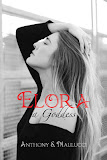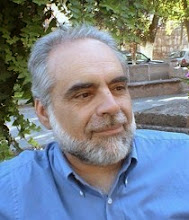Tell us about your new release, ELORA, a Goddess, and what sets it apart from your other novels
about Italian American culture? The new novel is
about a beautiful young woman from Boston who becomes a high-fashion model in
New York in the early 1980s at a time when shallow mainstream culture began to
take over the spiritual counterculture movement of the 1960s. She becomes caught
up in all glamour of being a successful model and all the decadence of the time
and she loses her innocence and her natural, soulful beauty. So in a way she is a symbol of the
destruction of the 1960s counterculture by the greedy capitalists who control the
mainstream media.
My fiction about
Italian American life depicts an authentic subculture that is on the verge of
extinction. It is also intended to show that we Italian Americans have much
more richness and depth than the media and movie stereotypes of mafia
gangsters.
Was there a time when you wanted intellectual recognition as an
author as opposed to now, do you see the book and art world differently? These are two separate and very big questions. To answer the
first one only, I’ve always wanted recognition as a serious artist. That hasn’t
changed. What has changed is that I hope to reach more readers by offering them
a compelling story about successful people who are engaged with mainstream
society instead of stories about struggling artists, loners and outsiders,
stories about human suffering and self conflict. I want to show that these
so-called successful people have paid a high price for their success in the
loss of their soul, their humanity and their natural beauty.
What do you want your readers to get out of ELORA? Hopefully what I put into it, which is to believe in themselves,
to hold their life as a sacred trust, not to sell themselves for a shallow
success, and not to compromise their integrity for any reason whatsoever. There
are some explicit sex scenes in the new book which are meant to show the reader
the depravity of the characters who use Elora for their own ends, and I hope
readers will not be offended by them. They are intended for shock value only.
How has your personal life affected your writing style, and the
content of which you write? I explored many
different types of work – bookselling, theater, journalism – in addition to
several odd jobs before settling on college teaching as a long-term career.
I’ve lived in 7 major cities in three countries for extended periods. I now
live in Mexico. I guess you could say that my life has been a bit unrooted and
bohemian, yes, definitely bohemian. I’ve learned a great deal from every place
I’ve lived. This lifestyle of the bohemian artist has given me an open-minded
perspective on life. Change has been a constant for me and I take it in stride.
My philosophy can be summed up as “each
to his own” and “live and let live.” I’ve been told I have the knack of being
able to talk to anyone. I find people fascinating. I love talking to people
from all walks of life. This carries into my fiction, which is definitely
character driven.
How do you see young writers of this generation, and do you have
any advice for them?
Explore the world first-hand, and never lose your sense of wonder and
curiosity. Writers need to learn
about life, about themselves and about other people. My first advice would to
get out there and live, get to know yourself, learn about life and what makes
people tick, always write because you
love to, write with passion, from the heart, be a truth-teller and don’t worry
too much about technique and don’t edit yourself too much in your early drafts.
Write with honesty and tell the truth about life and people as you see it.
My overall impression
of young writers of your generation is that they are in a rush to get their
work out there on the web before it’s ready to “go public,” i.e. be published.
My advice is to take your time and allow your talent to develop. You need to
have your work read by someone whose opinion you can trust and value rather
than a crowd of strangers. One good mentor-editor is worth a thousand times
more than random opinions on the web. Hemingway’s early writing style was
nurtured by one editor-friend, Gertrude Stein. Find someone who believes in
your talent and cultivate a personal relationship with her. Just keep writing
and don’t publish until you have found your true voice.
I see them as striving
to be their best but perhaps being too focused on technique rather than powerful
storylines and in-depth psychology. I don’t read a lot of fiction by young
writers, so it’s hard and really unfair for me to generalize. But based on what
I’ve read in the media about new books by these writers I’d have to say that
they seem to be mostly concerned with writing about identity and romantic
relationships. They are writing about the need for love and finding a
connection. That’s really no different from what writers of my generation are
writing about – the need to connect. My advice to them is to write about their
own experiences, what they know first-hand, yes, but also to stretch their
imaginations and write about characters who are older and different from them.
Write about people as they are and not about how you would like them to be.
Finally, read as much
serious fiction and drama as you can, especially the world literature classics.
I repeat: Read, read, read the classics.
What made you want to write? Neither of your parents were
writers. My parents weren’t writers but they loved a
good story. My father told amusing anecdotes about people he knew and my mother
had a keen interest in human psychology. I just had a natural need to put
stories on paper. It was a kind of self-validation. I started out trying to
imitate the stories I loved as a boy, namely adventure stories and tales by
Edgar Allen Poe. Later on, one of my high school English teachers and several
of my college professors encouraged me. I won first prize in two national
student writing contests.
Have you ever known an Elora in your own life? Yes, I’ve known several. They were beautiful young women who
were more than willing to pay the price of becoming “stars” or “celebrities” by
“selling out,” that is, cheapening themselves and vulgarizing their natural
beauty.
In general, how many drafts do you write before your novel is
satisfactorily complete?
Inspiration versus hard
work. I need both. I used to write many drafts of a story because I needed that
process to get rid of the bad writing and find the story I really wanted to
tell. Now I’ve simplified the process. I’ve also simplified the stories I tell.
I try to make them purify them by eliminating the unnecessary details and
reducing them to their essence.
As Mark Twain said,
good books write themselves. I’ve found that to be true. I meditate and think a
lot about what I want to say before I sit down and start writing. If the voice
I hear is a true voice, then I let it take over, I do not interfere with it by
and self-editing at that early stage. Later on, once I have a completed draft,
I set it aside and let it incubate, then I read it over with a more objective
eye. That’s when I start editing and polishing. At some point I have to let it
go, otherwise I would be tinkering with it forever. Even after a book of mine
has been published I still want to make changes, but I have to hold back and
let it be as it is.
If I am captivated by
a story and compelled to write it, then the writing goes very fast and very
smoothly. I won’t say “easily” because writing is hard work and if you think
too much about how challenging it is you may never start. But once I have hit the
right groove it just unfolds on its own, the characters come alive and I become
a conduit for their story. It flows through me and I marvel as I write, and the
writing becomes a kind of ecstatic experience which cannot be repeated. Every
book for me is new and different even though I may be telling the same story
over and over again – my personal take on life.
Do you base your characters on people you know in your life, or
even famous people? My characters tend to
be composites of people I’ve known. I prefer to write about “ordinary, real
people” and people who are true to themselves, who are a bit eccentric, and who
do not fit into the typical molds and patterns of conventional life. I do not write
about celebrities.
Tell your readers about other accomplishments in your life. I’m also a fine art figurative painter in oils, and I listen to
a lot of jazz and classical music. Somehow this helps my writing, but I can’t
explain how exactly. I also write for the stage and have had my work performed
many times in the US, Canada and Mexico. You can see some of my art work at my web site
www.anthonymaulucci.com
Tell us about the time period of when you wrote ELORA, and how
it directly affected the novel? I had moved to New
Haven, Connecticut after living in Manhattan for a year. My roommate was a
graduate student at Yale. We had many discussions about art and culture. He was
having trouble getting started on his master’s thesis, I wanted to write a
novel about my time in New York. So we challenged each other to see who could
make the most progress on his project by a certain date. That’s how I got
started on the book, as a kind of competition.
Finally, what are you trying to say in ELORA that could be important
to young people of today? Think hard and long
about the choices you make. Never sacrifice your personal ideals, never violate
your moral and artistic integrity for the sake of money and fame. Success at
any price is just not worth it. Fame is fleeting but you have to live with
yourself for the rest of your life. You need to make it a life well-worth
living.


No comments:
Post a Comment